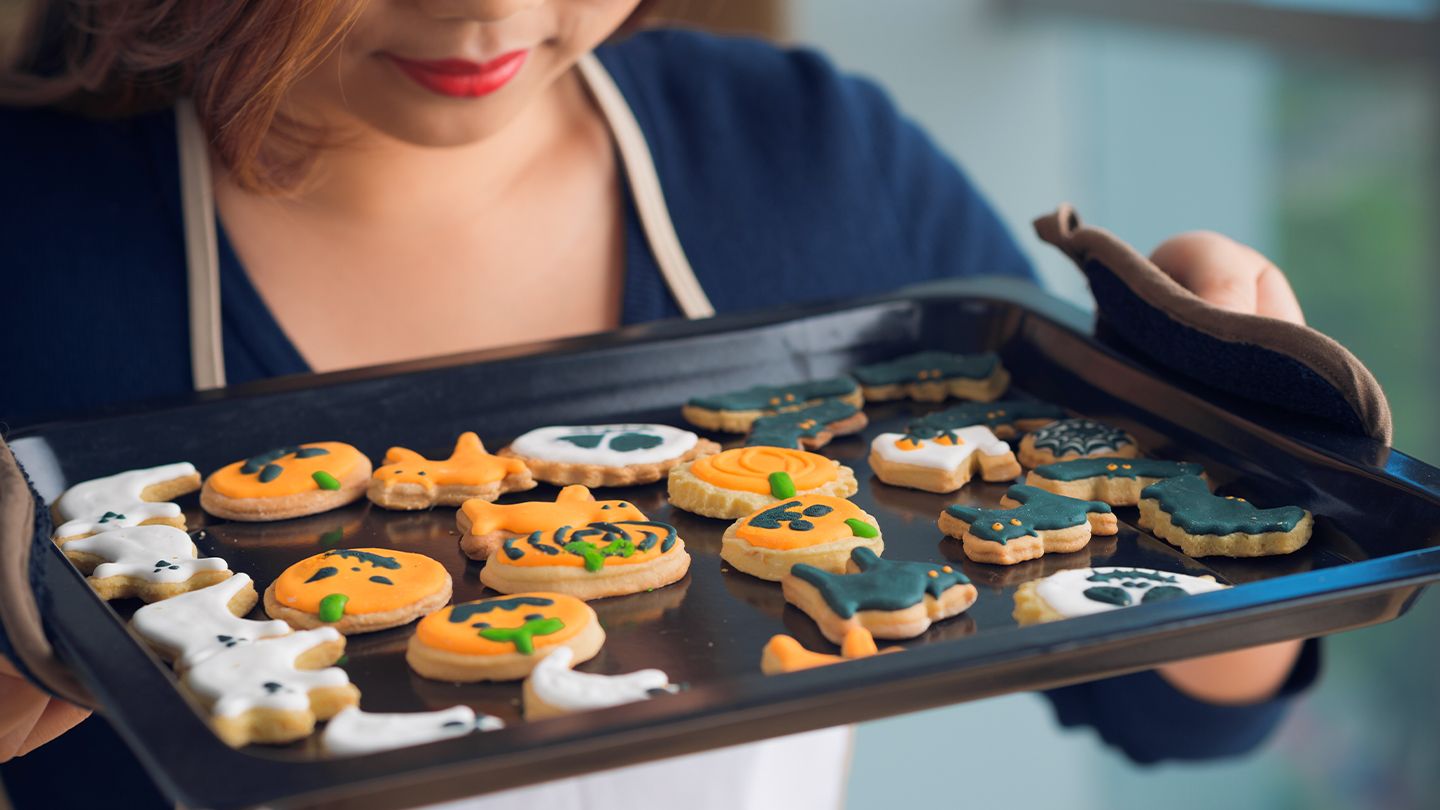With the influx of parties complete with high-calorie, festive foods and copious amounts of candy and chocolates, it’s no wonder holiday weight gain begins to creep in after Halloween and continues into the new year. What’s more, holiday weight gain can be cumulative (1), meaning people gain an average of one to two pounds over the holidays every year, says Dawn Jackson Blatner, RDN, author of The Flexitarian Diet. And if they don’t lose that weight throughout the year, it can add up over time.
That said, avoiding holiday weight gain is possible, especially if you start as early as Halloween. Ahead, experts share how holiday weight gain can happen and give tips for maintaining your weight this season without sacrificing your holiday fun.
Surprising Ways Holiday Weight Gain Can Happen
Some causes of holiday weight gain are obvious, such as an increase in get-togethers with festive foods and cocktails galore. “I call these ‘the littles,’ and they seem innocent enough on their own, but when they add up, the weight starts to creep up,” says Amy Shapiro, RD, founder and director of Real Nutrition.
But there are also psychological factors that can lead to weight gain during the holiday season. Stress and fatigue are at the top of the list. “Stressed-out [and tired] people often grab whatever food is convenient — which often is low in nutrition — and usually feel they don’t have time to prioritize exercise,” Blatner says. Furthermore, she says, busy holiday schedules make it harder to stick to a balanced nutrition and fitness routine and may decrease sleep quality, which could negatively impact weight management. (2)
Emotional eating can also come into play during the holidays. “Whether holidays bring up happy or sad memories for people, often that can lead to eating to self-soothe,” Blatner says. For this reason, she recommends leaning on non-food strategies for comfort during this season and beyond, such as hot showers, snuggling in a cozy robe, meditating, listening to calming music, and spending time with friends and family.
5 Ways to Prevent Holiday Weight Gain, Starting at Halloween
Despite the increase in parties, disruption of our regular routines, and the added stress during the holiday season, preventing holiday weight gain is possible. Learn five easy-to-implement tips below.
1. Don’t Skip Out on Candy and Treats
This may sound counterintuitive, but hear us out. According to Blatner, avoiding Halloween candy or other delicious holiday food, which is virtually everywhere during this season, isn’t the best strategy. Instead, she advises limiting your treats and slowing down to really savor them, rather than mindlessly munching. “Really taste it and do a little happy dance when eating delicious food,” she says. She also suggests pairing candy and treats with other things to make it more of a balanced snack. For example, a cut-up mini candy bar is great on top of a green protein smoothie or mixed into Greek yogurt.
Shapiro seconds this advice and adds that over-restricting calories in an effort to lose weight quickly before the holidays come up may have adverse effects. “Depriving yourself of cravings can lead to overeating or excessive caloric intake before you realize it,” she says. (3) “Instead, being consistent with your dietary and exercise habits before and during the holidays will be more effective to help you stay on track.”
2. Eat Three Balanced Meals and Healthy Snacks per Day
Staying on track with healthy meals is vital during the holiday season. Specifically, Blatner recommends eating three balanced meals every day to help stabilize your energy and blood sugar levels and calm cravings. “Hungry people crave more sweets,” she says. “Your sweet tooth is worse when you are skipping meals and grazing through the day.”
Shapiro also recommends healthy snacking directly before holiday festivities, as snacking can promote satiety and appetite control. (4) “Going to holiday meals with an empty stomach can lead to overeating,” she says. To combat this, Shapiro suggests having a protein- or fiber-rich snack (5) ahead of time, such as:
- A small handful of nuts (protein and fiber)
- A piece of fruit (fiber) and 1 tablespoon of nut butter (protein)
- A hard-boiled egg (protein) wrapped in lettuce (fiber)
“[These] can fill your stomach up beforehand and help you make the right, healthy choice during meals,” says Shapiro.
3. Keep Moving
Although it’s easy to find excuses to take rest days during the busy holiday season, Shapiro says these can really add up. To avoid this, she says, the key is to build a sustainable exercise routine that works for your holiday season schedule and aligns with the time you are most motivated to exercise during the day. The best part? Each workout doesn’t have to be super long. “A 15- or 20-minute high-intensity exercise can be as effective as a 45- or 60-minute moderate-intensity exercise, just depending on what you enjoy and what you can fit in,” Shapiro says. (6)
4. Keep a Food Journal
Keeping a food journal can also be a helpful tool for preventing mindless eating and avoiding holiday weight gain. “It’s a strategy of mindful eating (7), which allows you to record how much, when, and why you are eating, in addition to how you feel when you eat certain foods,” Shapiro says. “It’s easy to ‘slip’ and reach for seconds when you are not keeping track physically. Starting to be mindful of your dietary habits now can help you move smoothly into the holiday season without being constantly concerned and overwhelmed.”
In addition to jotting down these details, tracking your calorie intake (either via pen and paper or the Lose It! app) can also be a helpful way to keep you mindful of the quality and quantity of food you’re consuming.
5. Follow the One-Day Rule
Although Halloween is only one day, the festivities, foods, and treats tend to be around for a while leading up to and after the holiday. For this reason, Shapiro recommends applying the one-day rule — meaning you allow yourself to fully enjoy the holiday, but once it’s over, you get back to your regular routine. For example, come November 1, put away all the leftover Halloween candy so you’re less likely to eat it. Or, if that’s still too tempting, keep just a few pieces or donate the candy to a good cause.
Finally, remember the reason for the season. “Remind yourself that the season is all about enjoying the people and experiences,” Blatner says. “Focus on the fun, not just the food.”
Editorial Sources and Fact-Checking
- Díaz-Zavala RG, Castro-Cantú MF, Valencia ME, et al. Effect of the Holiday Season on Weight Gain: A Narrative Review. Journal of Obesity. July 4, 2017.
- Papatriantafyllou E, Efthymiou D, Zoumbaneas E, et al. Sleep Deprivation: Effects on Weight Loss and Weight Loss Maintenance. Nutrients. April 8, 2022.
- Hagerman CJ, Stock ML, Beekman JB, et al. The Ironic Effects of Dietary Restraint in Situations That Undermine Self-Regulation. Eating Behaviors. December 2021.
- Njike VY, Smith TM, Shuval O, et al. Snack Food, Satiety, and Weight. Advances in Nutrition. September 2016.
- Ortinau LC, Hoertel HA, Douglas SM, et al. Effects of High-Protein vs. High-Fat Snacks on Appetite Control, Satiety, and Eating Initiation in Healthy Women. Nutrition Journal. September 29, 2014.
- Guo Z, Li M, et al. Effect of High-Intensity Interval Training vs. Moderate-Intensity Continuous Training on Fat Loss and Cardiorespiratory Fitness in the Young and Middle-Aged: A Systematic Review and Meta-Analysis. International Journal of Environmental Research and Public Health. March 8, 2023.
- Fung TT, Long MW, Hung P, et al. An Expanded Model for Mindful Eating for Health Promotion and Sustainability: Issues and Challenges for Dietetics Practice. Journal of the Academy of Nutrition and Dietetics. April 26, 2016.

